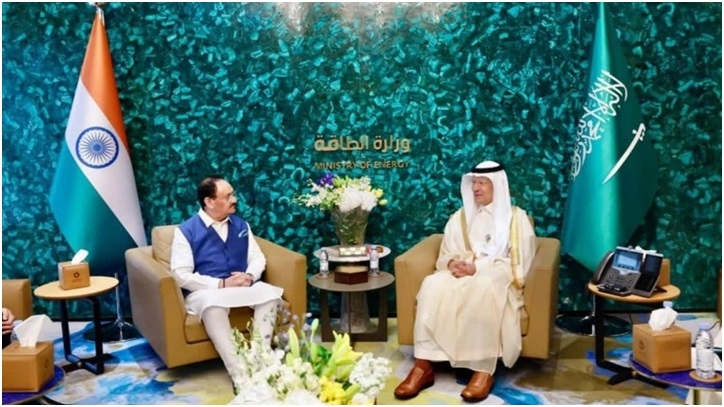Nadda's Saudi Arabia Visit: India, Saudi Discuss Collaboration In Fertilisers & Petrochemicals
Total Views |

New Delhi : In a bid to enhance bilateral cooperation between India and
Saudi Arabia in the field of Chemicals and fertilisers, Union Minister JP Nadda
visited the Kingdom from July 11-13, leading a high-level delegation that
included the Secretary and other senior officials from the Department of
Fertilisers and the Ministry of External Affairs.
Nadda held discussions on Sunday with the Saudi Minister of Industry and
Mineral Resources, Bandar bin Ibrahim Al Khorayef, in Riyadh on mechanisms to
strengthen partnership in fertilisers, petrochemicals, and pharmaceutical
sectors, the Ministry of Chemicals and Fertilisers said.
In a post on X, Nadda said, "Held a productive meeting with H.E.
Bandar bin Ibrahim Al Khorayef, Minister of Industry and Mineral Resources, in
Riyadh. Discussed deepening collaboration in fertilisers, petrochemicals &
pharma. Also witnessed signing of long-term DAP supply agreements between
Maaden & Indian PSUs (IPL, KRIBHCO, CIL) for 3.1 million MT annually from
FY 2025-26. A step forward in ensuring India's fertiliser security."
The two ministers also witnessed the signing of Long-Term Agreements
between Maaden and Indian companies- viz, IPL, KRIBHCO and CIL for supply of
overall enhanced 3.1 million metric tons of Diammonium Phosphate (DAP)
fertiliser per annum for five years from 2025-26 onwards, with further
extension of five years with mutual consent.
Both sides underscored their commitment to broadening the scope of
bilateral relations to include other key fertilisers such as urea, along with
DAP, aiming to further ensure India's fertiliser security, the Ministry said.
Discussions were also held on facilitating mutual investments, with a
focus on exploring opportunities for Indian Public Sector Undertakings (PSUs)
to invest in the Saudi fertiliser sector, and reciprocally, Saudi investments
in India.
Additionally, the leaders deliberated on avenues for collaborative
research, especially in developing India-specific customised and alternative
fertilisers to enhance agricultural productivity and sustainability.
In addition, a joint team has been set up, led by the Secretary (Fertiliser)
on the Indian side and Vice Minister for Mining Affairs in the Ministry of
Industry and Mineral Resources on the Saudi side, to explore long-term
collaboration in this sector.
Nadda also held a bilateral meeting with Prince Abdulaziz bin Salman Al
Saud, Minister of Energy, Kingdom of Saudi Arabia and co-chair of the Economy
and Investment Committee of the Strategic Partnership Council between India and
Saudi Arabia.
The duo discussed ways to enhance the economic partnership between the
two countries.
"Engaged in discussions with His Royal Highness Prince Abdulaziz bin
Salman Al Saud, Minister of Energy, Kingdom of Saudi Arabia and co-chair of the
Economy and Investment Committee of the Strategic Partnership Council between
India and Saudi Arabia on ways to enhance the economic partnership between the
two countries," Nadda said in another post on X.
He also met Abdulaziz Al-Rumaih, Saudi Vice Minister of Health, in
Riyadh. They discussed ways to enhance cooperation in the medical sector,
health services, pharmaceuticals, digital health solutions, and knowledge
exchange. In this context, they noted the significance of the bilateral MoU on
Health signed during the recent State Visit of Prime Minister Narendra Modi to
the Kingdom of Saudi Arabia.
Earlier on July 12, Nadda, along with the accompanying delegation,
visited Maaden facilities at Ras Al Khair and had a tour of the Phosphate
production plant. They were received by Hassan Al Ali, Chairman, Maaden
Phosphate and other senior officials of Maaden.
India is a key export
destination for fertilisers from Saudi Arabia, and Maaden is the leading
company in this sector in the Kingdom.
Chairman of the Saudi India Business Council, Abdulaziz bin Abdul Hadi Al
Qahtani, hosted a dinner for Nadda on July 11 in Dammam, in the presence of the
business community from the Eastern Province of Saudi Arabia.
In 2024-25, India's imports of DAP fertiliser from Saudi Arabia were 1.9
million MT, reflecting around 17 per cent increase over 1.6 million MT imported
during FY 2023-24. With the signing of these long-term agreements for DAP, the
supply of DAP will enhance to 3.1 million MT from FY 2025-26 onwards.

